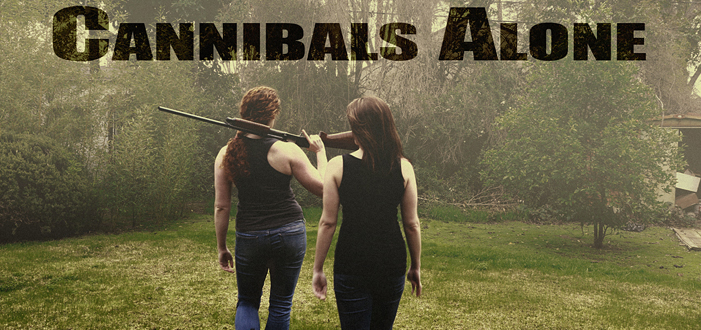
Cannibals Alone @ Theatre Unleashed 2-20-17
Is it better to suffer injustice or to commit it? The vigilante answers that, even if there is a risk of being an accomplice, it is better to enforce some notion of justice upon society, however corrupt it may be. There is something redeemable and salvageable which makes it worthwhile to erect a notion of justice inherently different than what is presently instituted by the political body in society. We can’t describe the pair of women in Cannibals Alone as vigilantes per se, but they are certainly enacting a form of justice different than the oppressive government in their society which possibly arbitrarily detains its citizens to prevent them from spreading some psychopathological contagion.
To say they disagree with their government’s policies is putting it politely. Yet that is not exactly the center of the entire narrative, only a justification for the plot’s very existence. It is, more or less, centered around the kinship of two women who have grown up together, and have supported each other’s livelihood until this very moment brought forth in the play wherein a schism is emerging. Where both individuals have fundamentally disparate outlooks on the world and how to interact with it. One is extremely paranoid about being quote “depo’ed”, the dystopic verbiage for detainment. The other finds the extreme paranoia as not constituting a life worth living.
Ironically, their disparity is not actually confronted directly; they participate in stereotypically female passive-aggressiveness towards each other for acting how each one thinks she should act, yet creates tension with the other. It is in fact quite simple to directly draw a line of causality between this passive-aggressive demeanor, i.e. the lack of willingness to clear the air and arrive at an objective conclusion for which they should make their next move in order to survive in this dystopia, and the deathly dissolution of the pair. It cannot be helped, then, to see this play as a critique of female cooperation; that even the closest of female bonds can lead to annihilation over petty retaliations rather than blunt strong-headedness at arriving at conflict resolution. This then calls into the question the integrity of the longevity of their subsistence. Is this the only example of disagreement between the pair? Perhaps, but perhaps there was none other so substantially existential.
But returning to the critique of female cooperation, we can see this entire play as an overall critique of the strain of feminism which upholds females as entirely self-sufficient beings onto themselves. i.e. a woman does not need a man. It is patently observed that the deficiencies in their cooperation could have been easily remedied had there been a man in their life. One of the most notable differences is in how easily bygones becomes bygones with men, enabling them to firstly cooperate more ably with others in forming organizations, and secondly to sustain such organizations because interpersonal conflicts are wasteful for achieving objectives. It cannot be ignored that this is an all-female cast. And while there are still men in this dystopic society, it is also telling that the duo found no need to actually bring any of them into their intimate plans, another indication of female reticence which makes organizing and cooperating impermeable. Comparing this to the innumerable scaled organizations in the industrial landscape and how they are all virtually male originated provides greater understanding, not for the deficiency in being female, but of her incompleteness in survival. There is nothing wrong with admitting one needs fulfillment in the opposite sex to be completed, which the inception of inane female drama in a life-or-death scenario surreptitiously demonstrates to the audience.

